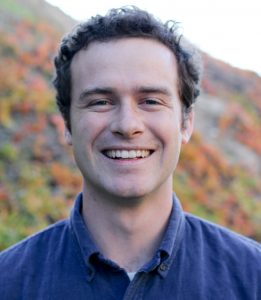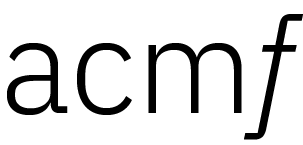Maximizing Your Time in ACME to Prepare for Grad School (Part 1)
A guest article written by Connor Robertson

A person’s experience in graduate school depends on many different factors: their reasons for attending, the school they attend, its program requirements, their advisor,the topic of research, their classmates and more. Since it is so unique, there’s not really a one-size-fits-all way to perfectly prepare. However, there are two ideas that I have observed in my experience and the experience of other ACME alums that I think can help any current ACME student boost their preparation:
1. Starting to learn how, and more importantly, what to research.
2. Writing is important, even in math.
In this article, I want to discuss these two invaluable skills and the potential positive outcomes for ACME undergrads that practice them before pursuring further education.
1. Starting to learn how, and more importantly, what to research
ACME does an incredible job of exposing its students to a wide range of graduate material in applied math and in teaching them how to handle tough graduate courses. However, in my experience, developing the ability to produce good research is something that requires reading, thinking, and a healthy dose of curiosity outside of class lecture and assignments. So let’s talk about a couple of small ways to practice research as an ACME undergrad.
The first step in practicing researching is to determine what it is that you enjoy researching. As an undergrad, this can be hard to figure out. For myself and some of my cohort, we are only just figuring it out two years into graduate school. To start, it’s impossible to choose a topic to research if you don’t first have an idea of what possibilities are out there. Although there are an overwhelming number of topics of research, taking time in your undergraduate to get exposure to some of them will guide your choice of graduate school and later your choice of graduate advisor which both make a huge difference in your experience.
So, if you find a topic in class particularly interesting, take a few minutes to go look at how or where it’s used. One way to try this would be to search for its key terms in Google Scholar and to choose a related paper to look over. If you are reading the paper’s introduction and can’t understand any of what it is talking about, ditch that paper and move on to another one or look for an introductory book. Many papers and books have applications included in either the introduction or a dedicated applications section, so a good way to explore would be to find those applications and related terms and to search for them as well. There is no need to be an expert on any of these topics or to learn material far beyond your ACME curriculum, but searching out literature like this is great practice and it will help you get an idea of the kinds of topics that are currently being researched. When you begin to consider which graduate school to attend, you’ll be able to look at the professor’s profiles and have some sense of what their research is about and what the department as a whole generally works on.
Another important way to get exposure to research topics is to attend in-person or online seminars and conferences. You can also find a lot of archived presentations from summer schools and conferences that are directed toward graduate students. I’ve found these presentations to be more suited for introductions and much easier to digest.
Of course, probably the best resource for getting started on research are the professors at BYU. They can talk to you about possible research topics, recommend papers, books, and presentations, and give you an introductory look at their own research. Since ACME is applied math, don’t feel limited to the mathematics professors. Some applied math graduate programs encourage or require collaboration with physicists, engineers, economists, biologists, or other fields. While I was at BYU, my interests in civil engineering led me to meet with a few engineering professors to discuss their research. Ultimately, those conversations influenced me to change my research direction away from what I thought I had wanted before. It is also possible that in visiting these professors and discussing their research, they will offer you an opportunity to participate in some undergraduate research. I highly recommend participating if it is at all possible. It is a straightforward conclusion that actually doing research is the best way to practice researching and the proof is left to the reader.
However, if you do get going on an undergraduate research project, don’t leave out exploring other topics and considering other possible avenues of research. From my experience, it is unusual for an undergraduate to know exactly what they want to research in graduate school, and if they do know, it is likely that it will later evolve or change entirely. But if you can get a general idea of what you enjoy, it will help you to determine which programs to apply to and to choose a department that generally researches topics that interest you. That will give you a wider possibility for choosing an advisor (again, this determines a LOT of your experience) and will give you the opportunity collaborate with your future classmates on both coursework and research.
2. Writing is important, even in math
My dad always told me, “You need to learn to write because even as an engineer, that’s all I do.” Of course, I didn’t listen and have despised writing from a young age. Unfortunately, he was absolutely right. If you can’t explain on paper what research you did and why it’s important, your research ends with you.
That idea encapsulates more than just writing research papers. In graduate school, you will need to write grant and fellowship proposals, cover letters for summer schools, abstracts, presentations, small research summaries, class project reports, and endless correspondence emails with your advisor/s and their collaborators.
My simple recommendation to prepare for all that writing is to look for excuses to write explanations of material to yourself or anyone else. If you are reading something interesting and technical, take a few minutes after to write a summary as if you were writing to yourself just before reading it. Write an explanation to a study buddy when you’ve figure out a problem solution. Try to practice writing concisely and clearly and going through a few drafts. It would be good practice to try explaining the same material to someone with an equivalent level of knowledge as well as someone with very little knowledge of the topic.
There are some extra ways to practice writing than the ways you’d traditionally think of. One important one would be to practice commenting your code appropriately and to include some short docs if it needs additional explanation. I can’t tell you how many of my classmates have been given code for their research written by a previous graduate student with no comments or explanations and it slows them down significantly. Also, some of your ACME lab assignments use Jupyter notebooks, which have Markdown cells and support Latex equations for a good reason. It’s worth taking some time to write short descriptions in those notebooks between problems to practice putting the whole assignment together as a story.
Ultimately, writing is hard, I can’t stand it, but I recommend buckling down and doing it more often. Doing so will help you immeasurably with your future projects and will show when you are writing your graduate school applications and interviewing. Much of your graduate success will hinge on your ability to express your work on paper.
TL;DR
Graduate school is a very unique and individual experience. The ACME program will give you an amazing start on curriculum and important topics in applied math, so pay attention and do your best. But there are some extra ways to make the most of your time as an undergraduate to prepare for graduate school. Those include: thinking about what you would like to research, looking through research material on your own, and practicing writing about technical topics in different forms. If you get a chance, participating in undergraduate research at BYU or in a summer REU would help with all of these topics. Ultimately, practicing these concepts will help you make choices about what graduate school would fit you best and will boost your ability to get going on your research projects.
For the perspectives of other ACME alumni, see part 2 of this series, a Q&A with 7 alumni on the same topic.

